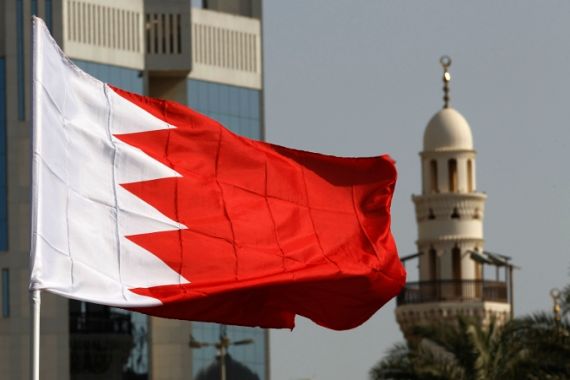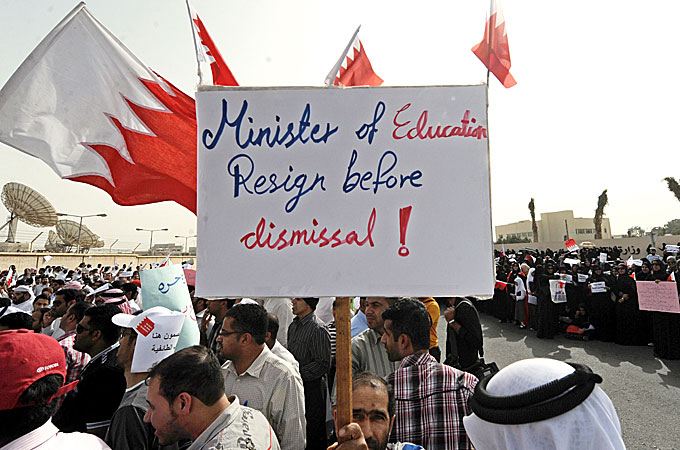Sectarian clashes at Bahrain school
Violence between Shia and Sunni parents at school as Gulf nation braces itself for Friday’s march on the royal court.

 |
| Protesters have demanded the resignation of the education minister, accusing him of flaring sectarian tension [EPA] |
Sectarian clashes have broken out at a Bahrain school, fuelling fears a planned march on the royal court could inflame tensions on the Gulf island where the majority of citizens are Shia but the ruling family is Sunni.
Witnesses said fighting broke out at the school in the town of Sar, where both Shias and Sunni live, when some Shia pupils launched anti-government protests on Thursday.
They said parents from naturalised families – Sunnis mainly from Syria and Pakistan who hold Bahraini passports – came to the school. Shia parents later arrived and clashes erupted.
“During the break we went on a peaceful protest, we gathered, a few girls,” said one student.
“Next thing we know a group of naturalised people were let into school and the school door was locked, they had iron and wooden sticks and knives.”
In a separate incident on Thursday, teachers, students, and their parents took part in a protest in front of the ministry of education, in Isa Town, south of Manama, the capital.
The demonstrators were demanding the resignation of Dr Majid bin Ali al-Naimi, the education minister, accusing him of flaring sectarian tension and not doing enough to protect students and teachers alike.
Separate rally
Moderate opposition leaders have urged hardliners to cancel Friday’s march against the royal family, warning it could spark clashes between Shias protesting against the government and Sunnis who support it.
Bahrain, home to the US Navy’s Fifth Fleet, has been gripped by the worst unrest since the 1990s after protesters took to the streets last month, inspired by uprisings that unseated entrenched rulers in Egypt and Tunisia.
Seven people have been killed in clashes with security forces, and thousands of the February 14 youth movement still occupy Pearl roundabout, but the opposition is increasingly split.
Shias say they are excluded from jobs in the security forces and view Bahrain’s practice of settling Sunni foreigners serving in the police as an attempt by its rulers to change the sectarian balance, an accusation the government denies.
Moderates led by Wefaq, the largest Shia party, are calling for constitutional reforms and have called a less provocative rally for Friday that is expected to draw tens of thousands.
One faction of the youth movement urged Wefaq and Sheikh Issa Qassim, the leading Shia cleric, to help them stop hardliners from “inciting our youths on the roundabout to hold a march at three o’clock tomorrow to the royal court in Riffa to cause strife and the fall of innocent victims in the people’s ranks”.
The coalition of much smaller Shia parties behind the march on the royal court are calling for the overthrow of the monarchy and the establishment of a republic.
The demands thave alarmed many Sunnis who fear this would play into the hands of the oil-producing Gulf’s main Shia power, Iran.
The march on the king’s palace would go through the Riffa area, where Sunnis and members of the royal family live, risking the first direct confrontation between protesters and royals.
No more than a few hundred are expected to join the march, but politicians and activists on all sides expect Sunni civilians to come out to block their advance.
“Tomorrow will be a tough day,” said a political source, who declined to give his name, told the Reuters news agency.
“If they make the journey they will be met by plainclothes people and not security forces … These protesters are trying to derail the political process because in an election they could not win a seat if they tried.”
Aid package
Fellow Gulf Arab oil producers on Thursday announced a $20bn aid package for Bahrain and Oman.
The job-generating measure, which will give $10bn to each country to upgrade their housing and infrastructure over 10
years, was above the $10bn to $15bn indicated by officials during discussions earlier this week.
Sheikh Khaled bin Ahmed al-Khalifa, Bahrain’s foreign minister, referred to tensions as he announced the aid package on Twitter: “Dear Bahraini … messages of unity, brotherhood and social harmony are our most powerful weapons to fight sectarian strife.”
A statement from the foreign minister of the United Arab Emirates and the Gulf Co-operation Council also said it supported recent calls for dialogue from Sheikh Salman bin Hamad al-Khalifa, Bahrain’s crown prince.
“We expect all Bahrainis will be willing to support this approach.” said Sheikh Abdullah bin Zayed al-Nahayan.
Direct dialogue has yet to begin between the crown prince and the opposition, which has called for assurances of concrete and wide-ranging reforms before they enter into talks.